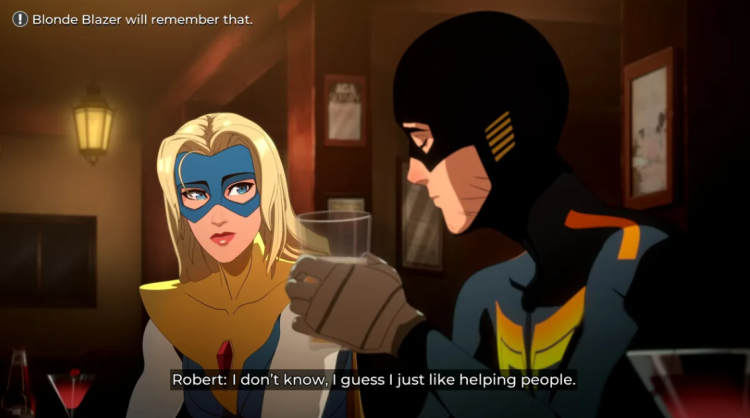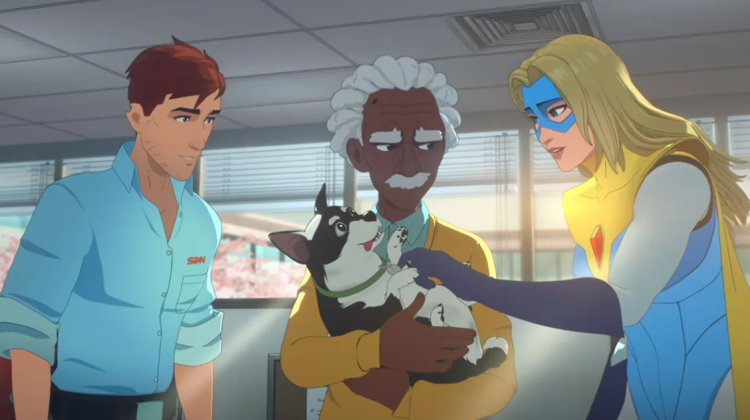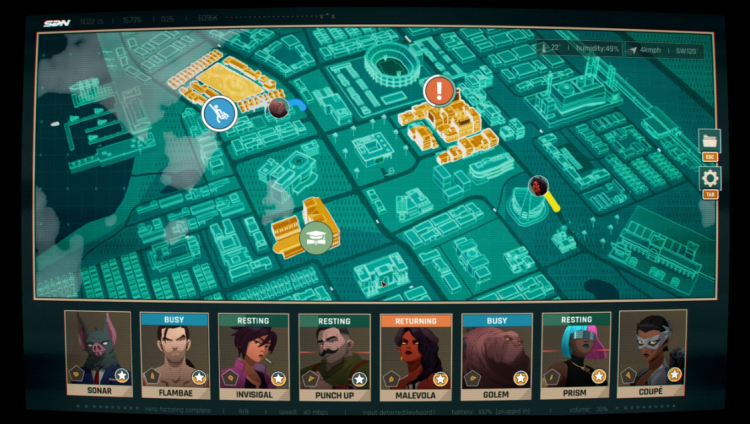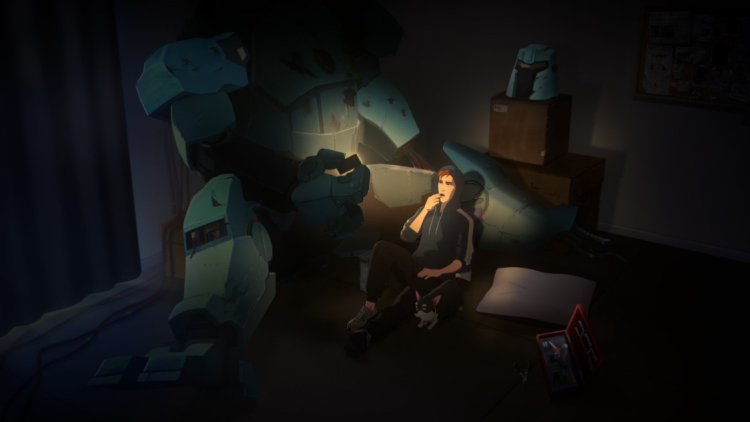Dispatch Review: AdHoc Studio’s Episodic Superhero Comedy Balances Chaos, Humor, and Humanity
The first two episodes of Dispatch have arrived, and they already feel like a statement of intent. AdHoc Studio’s eight-part adventure — set in an offbeat Los Angeles where heroes, villains, and ordinary citizens coexist uneasily — has the confidence of a team that knows the texture of good storytelling. It’s both absurd and grounded, a workplace dramedy disguised as a superhero game. The humor lands, the tension builds, and the format recalls the episodic heyday of Telltale Games, whose influence is unmistakable in structure and rhythm.
As Sarah Thwaites writes in her IGN review in progress:
Dispatch feels like a spiritual successor to the Telltale Games of the 2010s.
It’s a fitting description. The dialogue-driven sequences, the branching responses, and the faint anxiety of every choice recall The Wolf Among Us more than anything released in the past five years. Yet there’s something more here — a willingness to experiment with tone and pacing that feels new, even for a genre often built on choices and consequences.

The game’s premise is as strange as it is specific. In this version of Los Angeles, a private corporation called the SDC (Superhuman Defense Coalition) offers protection insurance to the city’s residents. Pay the premium, and a licensed hero will swoop in when trouble strikes. It’s a world where power is commodified, where ethics bend to bureaucracy, and where even caped saviors answer to human resources. The player inhabits the life of Robert Robertson — a former hero known as Mecha Man — who, after losing his powered suit in an explosion, finds himself grounded and reassigned to a desk job.
The early episodes focus on Robert’s first days as a dispatcher, a kind of cosmic call center agent who sends field operatives to emergencies. Those operatives aren’t ideal employees — they’re reformed villains trying to reenter the workforce, each nursing old grudges and volatile temperaments. The tension between authority and dysfunction drives much of the humor, but the writing avoids cheap irony. The jokes land because the situations are painfully familiar, even if they involve telepaths and shape-shifters instead of office interns.
AdHoc’s presentation splits the experience into two distinct halves. Conversations play out in hand-animated cutscenes, each decision punctuated by small visual cues or branching reactions. Between story beats, the game shifts to Robert’s workstation — a minimalist interface filled with blinking alerts and countdown timers. From there, players assign heroes to incidents based on their abilities, temperaments, and availability. It’s half puzzle, half management sim, and while it’s simple on the surface, its timing and pressure create real momentum.

Read also, Aaron Paul, widely recognized for his iconic performance in Breaking Bad, returns to gaming as the voice of Mecha Man in Dispatch. He also reflected on his long-standing passion for games and storytelling, saying that Dispatch offered “the perfect mix of performance and player connection,” allowing him to explore a character shaped as much by regret as by resilience.
When Dispatch is at its best, those two halves overlap. A messy conversation with a disgruntled teammate might leave you second-guessing their reliability just as a new crisis appears on your map. A snarky decision in dialogue might later impact morale or performance. Thwaites notes that “even the most nonchalant comment could impact the tale,” and that unpredictability gives the story weight. It’s a small but vital distinction from games that gesture toward consequence without ever delivering it.
The cast amplifies the writing’s rhythm. Aaron Paul brings worn-out sincerity to Robert Robertson, turning a fallen hero into something close to tragicomedy. Laura Bailey’s Invisigal (once “Invisibitch”) oscillates between sarcasm and vulnerability, while Erin Yvette’s Blonde Blazer runs the SDC with a brittle charm that conceals deep insecurity. Jeffrey Wright, as veteran hero Chase, delivers the script’s sharpest dialogue with the effortless cadence of someone who understands how authority can curdle into disillusionment. Every exchange feels distinct, even when the camera lingers too long or a joke overstays its welcome.

Mechanically, Dispatch experiments with tone and urgency. The core assignment game — selecting heroes for missions under time pressure — recalls the compulsive rhythm of old management sims, but its integration into the narrative gives it extra dimension. Each success or failure slightly alters how characters speak to you, a small ripple that keeps players alert. Then there’s the hacking minigame: a 3D maze navigated under strict time limits, its tension heightened by radio chatter describing simultaneous disasters. It’s the kind of structural risk older Telltale episodes rarely took, and it pays off here by breaking up dialogue-heavy sequences without derailing the story’s pacing.
What distinguishes Dispatch is restraint. AdHoc could have easily leaned into parody — its world of corporate superheroes, overworked villains, and media-savvy crises invites it — but the writing often pauses where other games would rush to a punchline. When Robert chooses silence or deflection, the moment hangs just long enough to register as human rather than comedic. Thwaites notes that “this measured restraint imbues the world with a sense of realism that’s easy to get emotionally invested in.” She’s right: the absurd premise only works because the people inside it behave like they’ve lived with it for years.
There’s an emotional current beneath the humor that keeps the first two episodes from feeling disposable. Robert’s struggle to redefine heroism — stripped of his mech suit, hemmed in by office politics — becomes a meditation on purpose. His colleagues’ self-interest clashes constantly with the rhetoric of saving lives, creating a believable tension between redemption and routine. These are superhumans with mortgages and anxiety, fighting less against villains than against paperwork and exhaustion.

Visually, the game adopts a subdued style — expressive without excess. Animation carries personality rather than polish, and small gestures often say more than spectacle could. Backgrounds are dense but uncluttered, the palette muted to emphasize conversation over chaos. The effect is theatrical, closer to an ensemble TV show than a blockbuster game.
If the early chapters are any indication, AdHoc is building a series that values conversation over combat, character over conquest. Yet it never forgets that pacing matters: choices arrive quickly, scenes turn sharply, and humor cuts through sentiment before it cloys. The decision system borrows familiar cues — the small “X remembered that” pop-up is an obvious callback — but it feels less nostalgic than affectionate, a quiet nod to a genre that shaped a decade of narrative design.
Dispatch also suggests a pragmatic evolution of episodic storytelling. Its release schedule — two episodes per week, concluding mid-November — mirrors television rhythm more than game tradition. Each installment carries enough closure to stand alone while feeding forward into the next. It’s a structure designed for sustained engagement rather than binge consumption, and it suits the story’s office-serial tone.
Still, this is a review in progress, not a verdict. Only a quarter of the story has unfolded, and AdHoc’s ultimate destination remains hidden. But early signs point to a studio in control of its medium. The writing is confident, the performances lived-in, the pacing assured.
Thwaites concludes her assessment with cautious optimism:
“It’s still early but, as of right now, I’m totally enthralled in this world.”
That balance — enthusiasm tempered by patience — fits the work itself. Dispatch doesn’t demand awe; it earns attention through craft, rhythm, and wit. If AdHoc can sustain this energy through its final episodes, it may not just echo the Telltale legacy — it may quietly outgrow it.

Comments